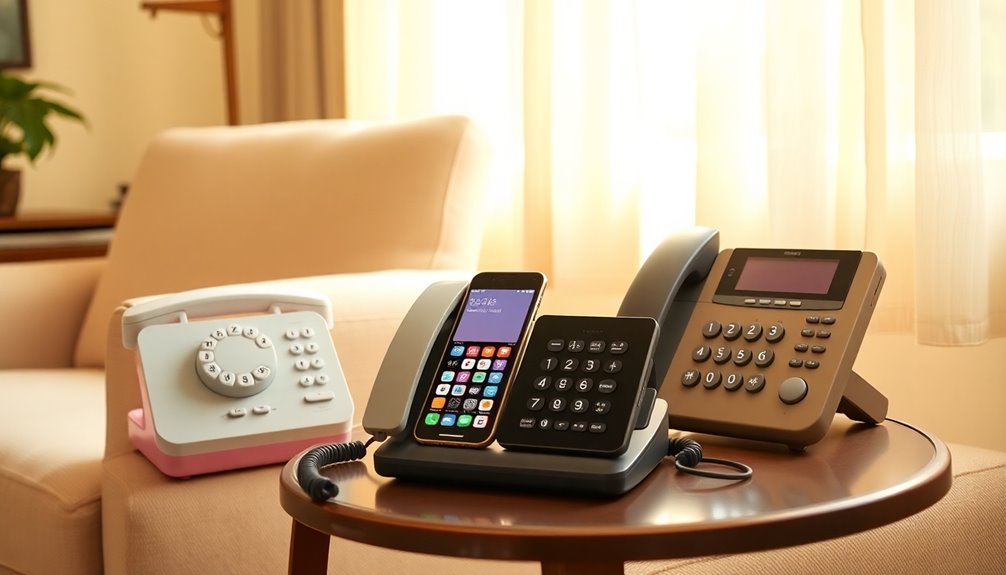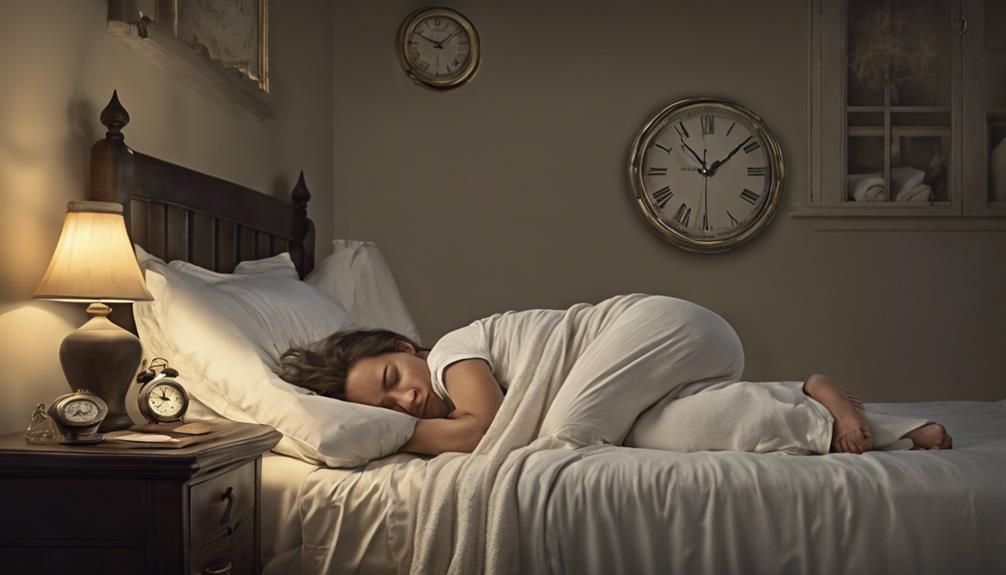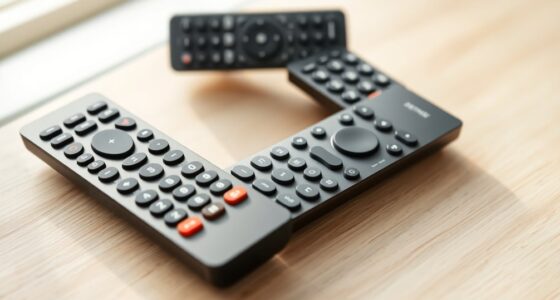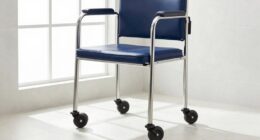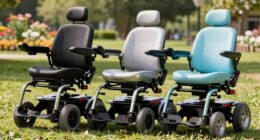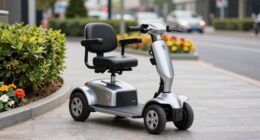If you're looking for the best home phones for elderly users, I've found some fantastic options that combine ease of use and accessibility. The Serene Innovations Amplified Big Button Phone and the VTech Amplified models stand out for their clear sound and large keypads. Corded phones like the Panasonic and AT&T BL102-2 are reliable choices as well. Each of these phones has unique features to enhance communication at home, so stick around to discover more great selections!
Key Takeaways
- Look for phones with large, illuminated keypads and high-contrast displays to enhance visibility for seniors.
- Opt for amplified phones with loud ringers and audio assist features for improved call clarity and hearing support.
- Choose models with photo buttons and one-touch speed dial for easy access to important contacts, especially for users with dementia.
- Consider phones with call blocking features to filter out unwanted calls and enhance user peace of mind.
- Ensure durability and reliability, selecting corded options for consistent functionality during power outages.
Serene Innovations Amplified Big Button Landline Phone for Seniors
If you're looking for a home phone that truly caters to the needs of seniors, the Serene Innovations Amplified Big Button Landline Phone stands out with its impressive 26dB amplification. This phone's big buttons make dialing easy, while the one-touch speed dial with portrait photos is a game changer for memory assistance. I love that it operates during power outages, ensuring I'm always connected. The adjustable volume and loud 85 dB ringer are perfect for clear communication. Users rave about its clarity and ease of use, making it ideal for anyone with cognitive, visual, or hearing challenges.
Best For: Seniors with dementia, hearing impairments, and visual impairments who need an easy-to-use landline phone.
Pros:
- Large buttons facilitate easy dialing and reduce user errors.
- One-touch speed dial with photo buttons aids memory and quick access to contacts.
- Operates during power outages, ensuring consistent connectivity.
Cons:
- The speakerphone button lacks a visual cue, which may confuse some users.
- Programming memory buttons can be tricky for some individuals.
- Some users report static and inconsistent volume levels during calls.
AT&T BL102-2 DECT 6.0 Cordless Phone with Answering Machine
The AT&T BL102-2 DECT 6.0 Cordless Phone with Answering Machine stands out as a top choice for elderly users, primarily due to its large, high-contrast display and lighted keypad. It features a digital answering machine that records up to 22 minutes of messages, ensuring you never miss important calls. The smart call blocker automatically filters out robocalls, and the caller ID announcer makes screening calls effortless. With its long-range capabilities and audio assist for clearer conversations, it's designed for ease of use. Overall, it's a reliable choice that combines functionality with accessibility for seniors.
Best For: The AT&T BL102-2 DECT 6.0 Cordless Phone is best for elderly users who need a user-friendly phone with accessibility features.
Pros:
- Large, high-contrast display and lighted keypad make it easy to read and dial.
- Smart call blocking effectively filters out unwanted robocalls.
- Digital answering machine records up to 22 minutes of messages for added convenience.
Cons:
- Some users find the setup process complicated.
- There may be occasional issues with the call blocking effectiveness.
- Accessing the directory can be challenging for some users.
VTech Amplified Corded/Cordless Senior Phone with Answering Machine
For seniors or individuals with hearing impairments, the VTech Amplified Corded/Cordless Senior Phone with Answering Machine stands out as an ideal choice. I love its 90dB loud ringer and oversized buttons, which make calls easy to manage. The smart call blocker is a lifesaver, filtering out unwanted robocalls while letting me save important contacts with photos for quick dialing. Plus, the Audio Assist feature enhances clarity, so I can hear every word. Although the cordless model can be a bit tricky with its buttons, the overall user-friendly design truly enhances communication for seniors like me.
Best For: The VTech Amplified Corded/Cordless Senior Phone with Answering Machine is best for seniors and individuals with hearing impairments seeking an easy-to-use communication device.
Pros:
- User-friendly design with oversized buttons and large display for easy dialing and reading.
- Effective smart call blocker that filters out unwanted calls and allows for personalized contact management.
- Enhanced sound quality with 50dB Audio Assist, improving speech clarity for better communication.
Cons:
- Cordless model may be confusing for some users due to multiple buttons and features.
- Average sound quality reported for the cordless phone compared to the corded version.
- Accidental pressing of the call block button can lead to unintended blocking of important calls.
Panasonic Cordless Phone with 2 Handsets (KX-TGU432B)
Designed specifically for seniors, the Panasonic Cordless Phone with 2 Handsets (KX-TGU432B) stands out with its user-friendly features. I love the large 2.1-inch display and big, easy-to-read buttons that make dialing a breeze. With a talk time of 10 hours and up to 5 days on standby, I never worry about running out of battery. The built-in flashlight is a handy addition for emergencies. Plus, the automated call blocking feature gives me peace of mind against robocalls. Overall, this phone combines clarity, convenience, and practicality, making it a fantastic choice for elderly users like myself.
Best For: Seniors seeking a user-friendly cordless phone with features that enhance clarity and ease of use.
Pros:
- Large, easy-to-read display and buttons improve visibility for elderly users.
- Built-in flashlight and automated call blocking features enhance safety and convenience.
- Long battery life with 10 hours of talk time and up to 5 days of standby.
Cons:
- Some users may find the setup process confusing, particularly seniors with cognitive impairments.
- Limited advanced features may not meet the needs of tech-savvy users.
- Additional handsets required for expansion are sold separately, increasing overall cost.
VTECH SN1127 Amplified Corded Answering System for Seniors
Offering an impressive 90dB ringer volume, the VTECH SN1127 Amplified Corded Answering System is an ideal choice for seniors who may struggle with hearing incoming calls. I love the 8 photo speed dial keys that make calling family effortless. The 40dB audio booster guarantees I never miss a conversation, while the big buttons and bright visual ringer are perfect for my aging eyes. With 22 minutes of message recording and a Slow Message Playback feature, I can easily catch up on missed calls. Overall, it's a fantastic blend of simplicity and functionality tailored for seniors like us.
Best For: Seniors and individuals with hearing or vision impairments who need a user-friendly phone system.
Pros:
- Loud ringer volume (90dB) ensures incoming calls are easily heard.
- Photo speed dial keys simplify calling loved ones with visual aids.
- Big buttons and high-contrast colors enhance visibility for easier use.
Cons:
- Limited ringer volume settings may not suit all preferences.
- Some users report challenges with retrieving messages, especially when using cell phones.
- Size and weight may be less portable for those who prefer a lightweight phone.
SMPL Big Button Phone for Seniors (Model 56012)
The SMPL Big Button Phone for Seniors (Model 56012) stands out for its six photo memory keys, making it an excellent choice for elderly users and those with dementia. I love how the large buttons make dialing effortless, which is a big help for those with dexterity issues. The adjustable volume, reaching up to 85dB, guarantees I never miss important calls. While the setup is straightforward, I noticed some users struggle with number formatting. Although it lacks a true speakerphone feature, the photo dialing boosts confidence, making it easier for seniors to connect with loved ones.
Best For: Seniors and individuals with dementia seeking an easy-to-use phone with large buttons and photo memory dialing.
Pros:
- Large buttons simplify dialing for users with dexterity issues.
- Photo memory keys enable quick connections to loved ones, boosting confidence in making calls.
- Adjustable volume ensures important calls are heard, even for those with hearing loss.
Cons:
- Wall mount compatibility issues may hinder installation due to design limitations.
- Confusing number formatting instructions can lead to connectivity problems for local calls.
- Lack of a true speakerphone feature limits communication options for users.
AT&T GL2101-2 DECT 6.0 Cordless Home Phone (2-Handset)
If you're looking for a home phone that prioritizes ease of use for seniors, the AT&T GL2101-2 DECT 6.0 Cordless Home Phone stands out with its large, lighted keypad and high-contrast display. This model features a clear speakerphone, caller ID, and call blocking for up to 20 numbers, which I find incredibly helpful. The two handsets provide a comfortable range, with DECT 6.0 technology ensuring excellent sound quality. Plus, the long-lasting battery gives me peace of mind, lasting up to 10 hours on a single charge. Overall, it's a reliable, user-friendly choice perfect for any senior household.
Best For: Seniors or individuals looking for a user-friendly home phone with essential features like large buttons and call blocking.
Pros:
- Easy-to-use lighted keypad and high-contrast display cater to seniors or those with vision difficulties.
- DECT 6.0 technology ensures clear sound quality and a long operational range.
- Long-lasting battery with up to 10 hours of talk time provides convenience and reliability.
Cons:
- Some users have reported low volume issues during calls.
- Limited Bluetooth connectivity for pairing with cellphones.
- Nuisance call blocking feature only allows for saving up to 20 numbers.
Panasonic Cordless Phone with Answering Machine (KX-TGD832M)
For seniors who struggle with unwanted calls, the Panasonic Cordless Phone with Answering Machine (KX-TGD832M) stands out due to its advanced call-blocking features. I love the one-touch call block button, which lets me easily block up to 1,000 numbers. The bilingual talking caller ID is a fantastic addition, announcing calls in both English and Spanish. With its illuminated keypad and large display, I can read everything clearly, even in low light. The sound quality is great, making conversations enjoyable. Overall, this phone combines convenience and functionality, making it a top choice for anyone seeking a user-friendly option.
Best For: Seniors and users seeking a reliable cordless phone with advanced call-blocking features and easy-to-read displays.
Pros:
- Advanced call-blocking features help eliminate unwanted calls, making it a great choice for those bothered by telemarketers.
- Bilingual talking caller ID allows users to hear incoming calls announced in both English and Spanish.
- Illuminated keypad and large display provide excellent visibility, enhancing usability in low-light conditions.
Cons:
- Some users may find the setup process confusing due to the abundance of features.
- Low speaker volume and occasional audio distortion reported by some users during speakerphone calls.
- The instruction manual lacks clarity, leading to difficulties for some users in understanding all functions.
Serene Innovations Amplified Big Button Landline Phone for Seniors
Designed specifically for seniors, the Serene Innovations Amplified Big Button Landline Phone stands out with its impressive 26dB amplification. I love the big buttons that make dialing a breeze, especially for those with visual impairments. The photo buttons are a fantastic touch, helping my loved ones remember who to call. With an 85 dB ringer volume and bright flashing light, I never miss a call. This corded phone operates during power outages, ensuring reliability. While some users report static, the overall clarity and ease of use make it a top choice for seniors needing extra assistance in communication.
Best For: Seniors with dementia, hearing impairments, and visual impairments who need an easy-to-use communication device.
Pros:
- Large buttons and intuitive controls make dialing simple for users with visual impairments.
- Loud ringer volume of 85 dB and bright flashing light for incoming calls ensure users never miss a call.
- Corded design allows the phone to operate during power outages, providing reliable communication.
Cons:
- The speakerphone button lacks a visual cue, which could confuse some users.
- Programming the memory buttons can be tricky for certain users.
- Some users report issues with static and the absence of a Caller ID feature.
Large Key Wired Telephone with Adjustable Ringing Tone and Volume
The Large Key Wired Telephone with adjustable ringing tone and volume stands out as an ideal choice for elderly individuals, especially those with hearing impairments. I love how the oversized keys make dialing effortless, and the adjustable earpiece volume guarantees I can hear every call clearly. The bright warning light is a fantastic feature that catches my eye, so I never miss important calls. Plus, it's lightweight and powered by the phone line, so I can rely on it even during power outages. With two memory buttons for emergencies, it's a practical and user-friendly option for anyone looking to stay connected.
Best For: Elderly individuals and those with hearing impairments seeking a reliable and user-friendly telephone option.
Pros:
- Oversized physical keys make dialing easy for users with limited vision.
- Adjustable earpiece volume and ringing tone cater to various hearing needs.
- Lightweight design and power line functionality ensure usability during power outages.
Cons:
- Some users report durability issues with the product over time.
- Performance may decline after extended use, according to some feedback.
- May require a phone line outlet splitter for simultaneous use with another phone.
AT&T CD4930 Corded Phone with Digital Answering System
With its user-friendly features, the AT&T CD4930 Corded Phone stands out as an excellent choice for seniors needing a reliable home phone. I love that it can digitally record up to 25 minutes of messages, making it easy to keep track of important calls. The backlit display is fantastic for readability, and with large buttons, dialing is a breeze. The audio assist feature really helps in amplifying calls, ensuring clarity. While the directory could use a bit more capacity, the overall design and performance make this phone a top pick for those who value ease of use and functionality in their daily communication.
Best For: Seniors and individuals who need a reliable, easy-to-use landline phone with clear audio and large displays.
Pros:
- Simple setup and user-friendly design with large buttons and easy-to-read numbers.
- Digital answering system allows for up to 25 minutes of message recording and easy playback.
- Audio assist feature amplifies sounds for better clarity, benefiting hard-of-hearing users.
Cons:
- Limited directory capacity of 25 entries, which may not be sufficient for some users.
- Directory not sorted alphabetically, making it harder to find contacts quickly.
- Abridged manual lacks detailed instructions, requiring users to refer to the full manual online for guidance.
SMPL Big Button Phone for Seniors (Model 56011)
For seniors seeking simplicity, the SMPL Big Button Phone (Model 56011) stands out with its six photo memory keys, allowing for quick dialing to loved ones. The large buttons make it easy to dial, even for those with dexterity issues. I appreciate the visual flasher for incoming calls, perfect for seniors who may be hard of hearing. The sound amplification is impressive, reaching up to 85 dB, ensuring I never miss important calls. While some users reported static issues over time, the overall design, including desk and wall mounting options, caters well to accessibility needs.
Best For: Seniors and individuals with cognitive decline or dexterity issues who need an easy-to-use phone with large buttons and quick dialing features.
Pros:
- Large buttons and easy-to-read numbers enhance usability for seniors and those with vision impairments.
- Photo memory keys simplify dialing, making it easier for seniors to connect with loved ones quickly.
- Sound amplification up to 85 dB ensures important calls are heard, catering to hearing-impaired users.
Cons:
- Some users reported static and echo issues affecting call clarity after a few months of use.
- There are programming challenges for memory keys, particularly for users with dementia.
- Compatibility issues with standard telephone jack plates may hinder installation for wall mounting.
Multifunctional Desktop Telephone for Elderly
Designed specifically for elderly users, the multifunctional desktop telephone offers an easy-to-use interface that includes 9 photo memory quick dialing buttons. I love how the adjustable volume allows for clear ringtones and conversations, making it perfect for various occasions. The hands-free function provides high-definition sound quality, ensuring comfortable communication. With eight editable home call functions and an SOS feature, it's incredibly user-friendly, especially for those with memory difficulties. Though some users reported static issues, many appreciate its simplicity. Just remember to order from reputable vendors to avoid potential defects. It's a great option for staying connected with loved ones.
Best For: This multifunctional desktop telephone is best for elderly users or individuals with memory difficulties who need a simple and effective way to stay connected with loved ones.
Pros:
- Easy-to-use interface with 9 photo memory quick dialing buttons for effortless calling.
- Adjustable volume settings ensure clear sound for ringtones and conversations, accommodating various environments.
- Hands-free function provides high-definition sound quality, enhancing comfort during communication.
Cons:
- Some users have reported static issues affecting sound quality during calls.
- Concerns about durability and potential malfunctions after several months of use.
- Experiences with product quality can vary significantly depending on the vendor, with some receiving defective units.
Clarity XLC3.4+ DECT 6.0 Amplified Cordless Phone
The Clarity XLC3.4+ DECT 6.0 Amplified Cordless Phone stands out as an excellent choice for seniors or anyone experiencing hearing loss, thanks to its impressive 50dB amplification and 95dB ringer volume. I appreciate its four customizable tone settings, which enhance sound clarity, and the visual alerts on both the base and handset make it easy to know when someone's calling. Plus, the big backlit buttons and high-contrast Caller ID screen improve visibility. While some users mention connection issues, I find its overall performance and ease of use make it a worthy investment for those needing extra support in communication.
Best For: Seniors and individuals with hearing loss seeking a reliable and amplified communication device.
Pros:
- Exceptional amplification of up to 50dB and a ringer volume of 95dB for enhanced audio clarity.
- Customizable tone settings and visual alerts on both the base and handset for improved usability.
- User-friendly design with big backlit buttons and a high-contrast Caller ID screen, making it accessible for seniors.
Cons:
- Some users report connection issues and static, which can affect call quality.
- Difficulty in button operation noted by a few users, potentially impacting usability.
- The price may be considered high by some, despite its valuable features.
Big Button Phone for Seniors – Corded Landline Telephone
When searching for a home phone that truly caters to seniors, the big button corded landline telephone stands out due to its one-touch dialing feature, which is perfect for those with visual impairments. I love the ergonomic foam handset cover that provides a non-slip grip, making it easier for those with grip issues. The amplified ringer and volume control are fantastic for hearing-impaired seniors. Plus, the memory keys offer quick access to loved ones, enhancing security. Despite some mixed reviews on sound quality, the lightweight design and responsive customer service make this phone a solid choice for many seniors.
Best For: Seniors with visual and hearing impairments who need a reliable and easy-to-use phone.
Pros:
- Large buttons with clear numbers designed for ease of use by visually impaired seniors.
- One-touch dialing and memory keys enhance security and quick access to loved ones.
- Lightweight design and ergonomic features make it user-friendly for those with grip issues.
Cons:
- Some users reported issues with sound quality, including buzzing and low microphone performance.
- The speaker phone volume may be inadequate for some users.
- Phone design can muffle sound when the handset is placed back on the base.
Factors to Consider When Choosing Home Phones for the Elderly
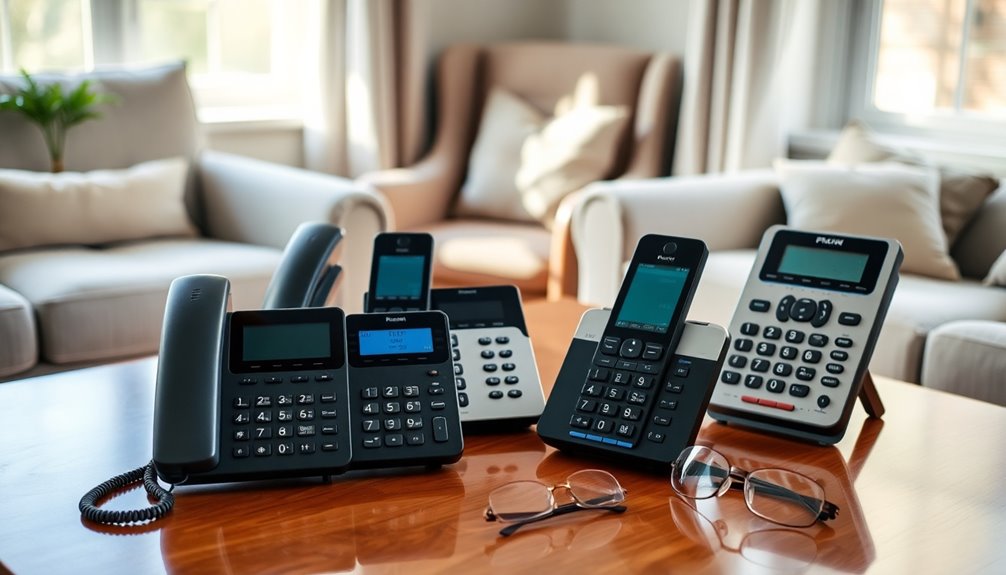
When choosing a home phone for the elderly, I think it's essential to take into account several factors that can make a big difference. Amplification levels, button size, and emergency features all play important roles in ensuring safety and ease of use. Let's explore these points to help you find the best option.
Amplification Level Considerations
Choosing the right home phone for elderly users requires careful consideration of amplification levels. Typically, these levels range from 20dB to over 90dB, with higher settings being ideal for those with hearing impairments. I recommend looking for phones that offer adjustable amplification, allowing users to customize the sound according to their specific needs. This feature enhances call clarity greatly. Additionally, consider models with extra-loud ringer volumes, which can exceed 80dB, ensuring that incoming calls are easily heard, even in noisy settings. Some phones also include audio assist technology that boosts certain frequencies, making speech clearer for those who struggle with background noise. Combining ringer volume and handset amplification creates an all-encompassing solution for seniors with varying degrees of hearing loss.
Button Size and Design
Selecting a home phone with the right button size and design is essential for elderly users, as it directly impacts their ability to communicate effectively. I've found that large buttons, often over 1 inch in height, make dialing much easier and reduce mistakes. High-contrast colors and clear numbering are vital for those with visual impairments, allowing them to identify the correct keys quickly.
Phones with oversized buttons that provide tactile feedback are incredibly helpful for individuals with dexterity issues or arthritis. Some models even feature photo buttons for speed dialing, which is a game-changer for seniors facing cognitive challenges. Ergonomic designs with non-slip grips and angled buttons also make handling the phone much more comfortable and secure.
Visual Indicators Importance
While many factors contribute to the usability of home phones for the elderly, visual indicators stand out as particularly essential. Bright flashing lights can alert seniors to incoming calls, which is especially important for those with hearing impairments. This way, they won't miss important communications. High-contrast displays enhance readability, making it easier for visually impaired users to identify caller information and navigate menus without straining their eyes. Phones with visual alerts also provide reassurance, especially for those who might be home alone or facing cognitive challenges. By reducing confusion and enhancing the user experience, effective visual aids greatly improve communication accessibility, fostering independence and well-being in daily life for older adults.
Emergency Features Availability
When it comes to home phones for the elderly, having emergency features can make a real difference in their safety and peace of mind. I've found that phones with dedicated speed dial buttons for urgent contacts are invaluable, allowing quick access to family or emergency services. Visual alerts, like flashing lights for incoming calls, can help those who are hard of hearing stay informed about emergencies. An SOS emergency call feature that dials specific contacts with a single press is also a lifesaver. Plus, adjustable volume controls for both the ringer and handset guarantee they won't miss critical calls. Finally, programming frequently dialed numbers with attached photos can be a huge help for seniors facing cognitive challenges.
Corded vs. Cordless
Choosing between corded and cordless home phones for the elderly can greatly impact their daily lives. Corded phones are reliable during power outages since they're powered by the phone line, which is essential for staying connected. They often feature larger buttons and simpler interfaces, making them easier for seniors with visual impairments or dexterity issues. On the other hand, cordless phones offer mobility, allowing users to move around while on a call, which can be beneficial for multitasking. However, they require periodic charging and may have limited battery life, posing a challenge for those who might forget to recharge. Ultimately, I recommend considering how each style aligns with the user's needs and lifestyle.
Ease of Programming
Selecting a home phone for an elderly loved one means considering how easy it is to program. I've found that many phones designed for seniors come with user-friendly features like photo memory keys. These allow users to dial frequently contacted individuals just by pressing a button with an image. Look for models with simple setup processes; the last thing anyone needs is complicated instructions. Dedicated emergency speed dial keys are essential, letting seniors reach help quickly without fussing with menus. Large buttons and clear labeling make a significant difference, especially for those with vision impairments. Visual indicators and simple audio cues can further aid in programming, ensuring your loved one can use the phone confidently and effectively.
Durability and Reliability
After ensuring a home phone is easy to program, durability and reliability come into play. I can't stress enough how important it is for these phones to withstand daily use and the occasional accidental drop. Look for models made from materials resistant to wear and tear. Reliability is equally essential, especially for corded phones that work during power outages, ensuring constant communication. Phones designed for seniors should feature reinforced buttons and sturdy bases to prevent tipping. Additionally, a good warranty often signals a product's reliability, giving you peace of mind. Finally, checking user feedback on durability can provide valuable insights into long-term performance, helping you choose a phone that holds up over time.
Frequently Asked Questions
What Features Should I Prioritize in a Home Phone for Seniors?
When choosing a home phone for seniors, I prioritize simplicity and clarity. Large buttons are a must, as they make dialing easier. I also look for features like adjustable volume and a bright display to aid visibility. A built-in answering machine can be helpful, too. Finally, I consider options with emergency buttons for added safety. These features guarantee that staying connected is both easy and enjoyable for my loved ones. Additionally, I research reviews and recommendations to find the best big button phones for seniors that truly meet their needs. It’s essential to select a device that not only caters to their visual and auditory requirements but also offers reliability. Ultimately, I want to ensure that my loved ones have a phone that not only enhances their communication but also gives them peace of mind.
Are There Any Home Phones Specifically Designed for Hearing-Impaired Seniors?
I've found several home phones that cater specifically to hearing-impaired seniors. Look for models that offer amplified sound, visual ringtones, and adjustable volume controls. Some even feature talking caller ID, which I think is incredibly helpful. It's vital to choose a phone with a user-friendly interface, too, so managing options remains simple. I've seen a few brands that really shine in these areas, making communication much easier for those with hearing difficulties.
How Can I Ensure My Elderly Family Member Uses the Phone Easily?
To guarantee my elderly family member uses the phone easily, I've found a few strategies that really help. First, I simplify the phone's setup by programming important contacts into speed dial. I also use large-button phones, which are easier for them to navigate. Additionally, I make certain the ringer is loud enough for them to hear. Finally, I encourage them to practice making calls so they gain confidence and familiarity.
What Is the Average Price Range for Senior-Friendly Home Phones?
When it comes to home phones for seniors, think of it like shopping for a cozy sweater—comfort and ease are key! I've found that the average price range for senior-friendly home phones typically falls between $30 and $100. Depending on features like large buttons, amplified sound, or emergency buttons, prices can vary. Investing a bit more might provide better usability, ensuring your loved one stays connected without hassle.
Can I Use a Senior Phone With Existing Home Phone Services?
Absolutely, you can use a senior phone with existing home phone services! When I switched to a more user-friendly model, I simply plugged it into the same phone jack I'd been using. It worked seamlessly with my landline provider. Just make sure the phone you choose is compatible with your service type, whether it's traditional landline or VoIP. I found it really easy to set up and enjoy the clearer sound quality!
Conclusion
In the world of technology, where sleek smartphones often steal the spotlight, it's heartening to see reliable home phones designed with seniors in mind. Picture a cozy living room, where a big-button phone sits proudly on a table, ready to connect loved ones with just a simple press. Choosing the right phone isn't just about features; it's about fostering connections and ensuring peace of mind. With these options, you'll find the perfect blend of simplicity and functionality.
